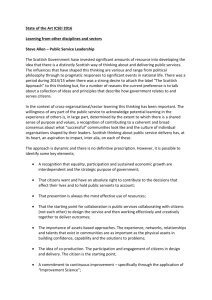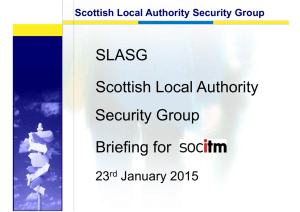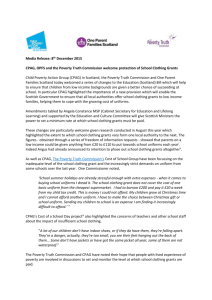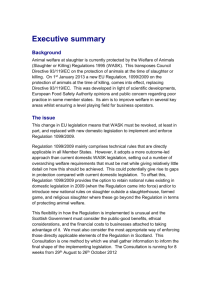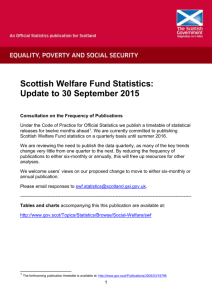Open - The Scottish Government
advertisement
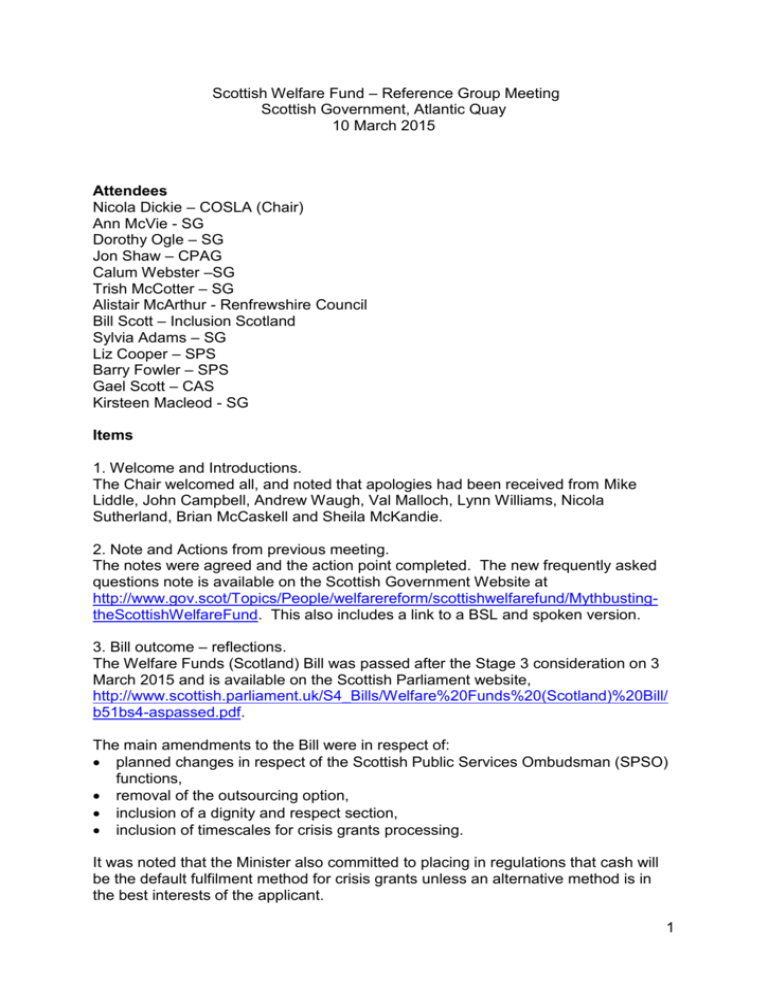
Scottish Welfare Fund – Reference Group Meeting Scottish Government, Atlantic Quay 10 March 2015 Attendees Nicola Dickie – COSLA (Chair) Ann McVie - SG Dorothy Ogle – SG Jon Shaw – CPAG Calum Webster –SG Trish McCotter – SG Alistair McArthur - Renfrewshire Council Bill Scott – Inclusion Scotland Sylvia Adams – SG Liz Cooper – SPS Barry Fowler – SPS Gael Scott – CAS Kirsteen Macleod - SG Items 1. Welcome and Introductions. The Chair welcomed all, and noted that apologies had been received from Mike Liddle, John Campbell, Andrew Waugh, Val Malloch, Lynn Williams, Nicola Sutherland, Brian McCaskell and Sheila McKandie. 2. Note and Actions from previous meeting. The notes were agreed and the action point completed. The new frequently asked questions note is available on the Scottish Government Website at http://www.gov.scot/Topics/People/welfarereform/scottishwelfarefund/MythbustingtheScottishWelfareFund. This also includes a link to a BSL and spoken version. 3. Bill outcome – reflections. The Welfare Funds (Scotland) Bill was passed after the Stage 3 consideration on 3 March 2015 and is available on the Scottish Parliament website, http://www.scottish.parliament.uk/S4_Bills/Welfare%20Funds%20(Scotland)%20Bill/ b51bs4-aspassed.pdf. The main amendments to the Bill were in respect of: planned changes in respect of the Scottish Public Services Ombudsman (SPSO) functions, removal of the outsourcing option, inclusion of a dignity and respect section, inclusion of timescales for crisis grants processing. It was noted that the Minister also committed to placing in regulations that cash will be the default fulfilment method for crisis grants unless an alternative method is in the best interests of the applicant. 1 The Scottish Government would like to note its thanks to all those who engaged with and assisted in the Bill process, including CPAG, SCVO, the Poverty Alliance and Inclusion Scotland. 4. Bill next steps – Regulations and Guidance. A copy of the draft guidance due to be published in April 2015 was discussed at the meeting. Topics discussed included: Potential clarification within the guidance around sanctions and suspension of benefits, short term benefit advances and budgeting loans. Sections of the guidance are still with the Department for Work and Pensions (DWP) for comment and all remarks/advice will be noted. Definitions of family – a child does not necessarily have to be included in order to meet the definition of a family. Potential inequities in how prisoners are treated due to the discretionary nature of the Fund and the delivery model. Prisoners receiving crisis grants v community care grants was carried into a meeting with the Scottish Prison Service which followed the Reference Group Meeting. Draft regulations were originally published prior to the Bill passing in Autumn 2014 for illustrative purposes only. A further paper was circulated to all Group members for consideration of the revisited priorities since the Bill was passed. Areas discussed included: Processing times – the timescale for processing crisis grants will now follow the wording in the Bill, Recording - to ensure consistency in how decisions are considered and evidenced, Fulfilment of grants – preferred methods of payment, and how to balance choice against need, Potential limiting of numbers of community care grants awards, Potential exclusions from the Fund, such as repatriation costs and structural work, Definitions of low income – how to avoid applying arbitrary rules of thumb, and still apply discretion, Review requests and how to apply – in writing, by phone/in person? Access to grants by those who have no recourse to public funds – currently with Ministers. Discussion included the treatment of suspensions of benefits, pending sanction or disallowance, whether or not a child should be included in the definition of a family under exceptional pressure and how best to frame the presumption in favour of cash for crisis grant awards. A public consultation will take place over Summer, and a draft consultation paper will be issued to the Group when drafted for comment. AP1 – any comments/thoughts on the draft regulations to be emailed as soon as possible. 2 AP2 – SWF team to issue a draft consultation paper to the group for quick comment. 5. Improvement work As previously noted, the frequently asked questions has been updated and published on the Scottish Government website. A general overview of current improvement work was given. Topics included ongoing co-production work with Inclusion Scotland and People First, SWF Local Authority decision makers, Highland User Group and the British Deaf Association to produce training materials. An easy read Welfare Funds Leaflet and a signed leaflet have been produced. Inclusion Scotland thanked the Scottish Government with regard to this work. A summary report of the findings and recommendations from the Case Observations carried out has also been issued to local authorities. 6. Project/transition plan and risk register Both the project plans and risk registers will be updated now that the Bill has passed. A new risk has been introduced to cover Universal Credit, as this is now rolling out across Scotland. The new responsibilities that are transferring to Scotland following the Smith Commission have resulted in changes within the Scottish Government and a new Division has been created - the Social Security Policy and Delivery Division – where the Scottish Welfare Fund now sits. There was discussion around IT systems and implementation dates, which will be taken up at the next Practitioners meeting in April. 7. Review of terms of reference As the original membership has changed somewhat, and the Bill has passed, it was agreed that the terms of reference and membership of the group should be refreshed. Looking ahead, the next meeting will be after the consultation period and provisionally will take place in September 2015. AP3 - all members to consider whether they wish to remain on the Reference Group, and advise the SWF team if not. Social Security Policy and Delivery Division Scottish Government March 2015 3







